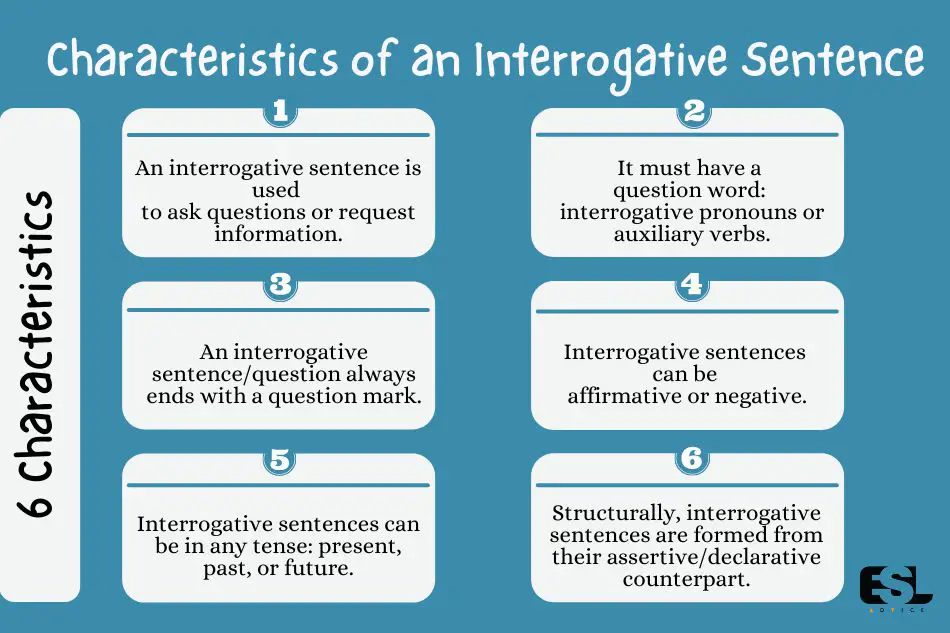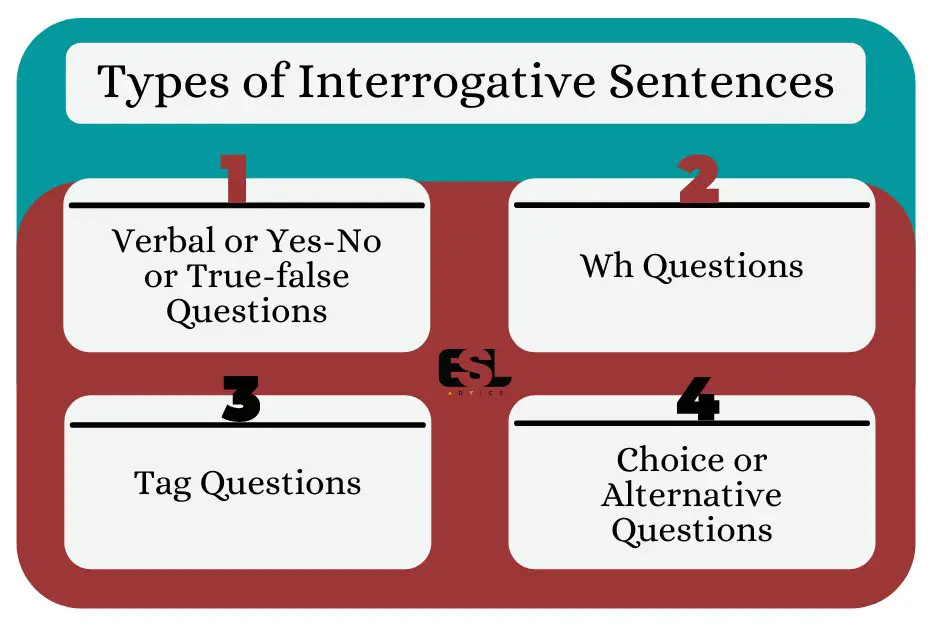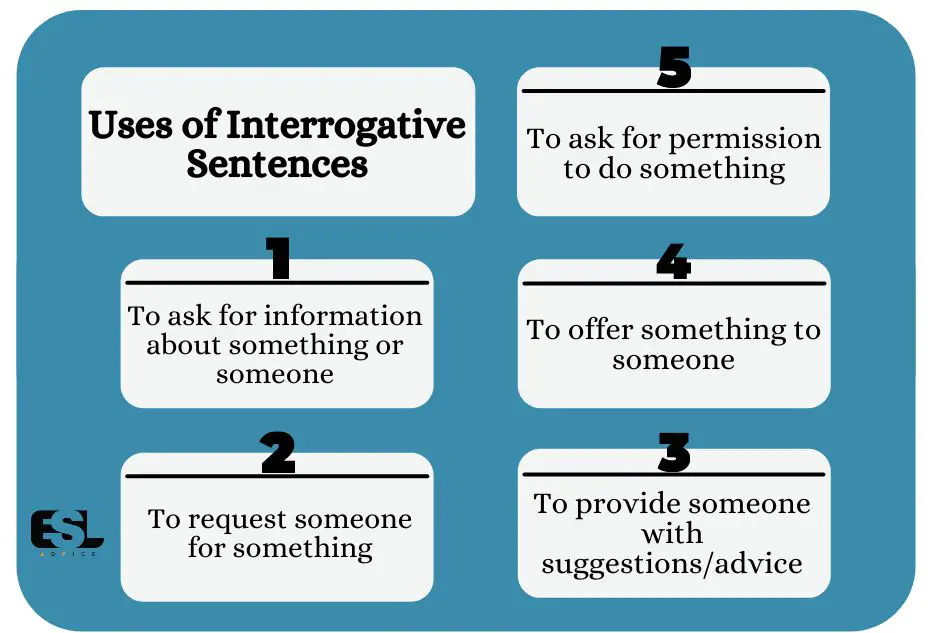An interrogative sentence is one of the functional categories of sentence that consists of question word(s) like what, why, how, when, do, is, are, will, etc. Interrogative sentences are also called questions because of their purpose of use.
Sentences that we use to ask questions are called interrogative sentences. An interrogative sentence is always followed by a question mark or note of interrogation. There are four kinds of interrogative sentences: verbal questions, wh questions, tag questions, and alternative questions.
Try The Blue Book of Grammar and Punctuation: An Easy-to-Use Guide with Clear Rules, Real-World Examples, and Reproducible Quizzes (Amazon Link) to understand the major rules and subtle guidelines of English grammar and usage. This best-seller includes easy-to-understand rules, abundant examples, dozens of reproducible quizzes, and pre and post-tests for middle and high schoolers, college students, ESL students, homeschoolers, and more.
In this post, I’ll discuss the characteristics and types of interrogative sentences. Let me begin with the characteristics of interrogative sentences.
Table of Contents
- 6 Characteristics of an Interrogative Sentence
- 4 Types of Interrogative Sentences
- Uses of Interrogative Sentences
- Final Words
- FAQ: Interrogative Sentences
6 Characteristics of an Interrogative Sentence

The fundamental characteristic of an interrogative sentence is that it is a direct question that must be punctuated with a note of interrogation. I have studied several grammar books and scholarly articles on interrogative sentences. From my research, I found six characteristics in total. Here they are.
1. An interrogative sentence is used to ask questions or request information.
Example: What’s your name?
This is an ideal example of an interrogative sentence because the speaker is looking for an answer (name) to a question through this sentence.
2. It must have question word(s): interrogative pronouns or auxiliary verbs.
Example: How are you?
The sentence consists of the question word “How” which is an interrogative pronoun here.
3. An interrogative sentence/question always ends with a question mark.
Example: Where are you from?
The sentence ends with a question mark (?).
4. Interrogative sentences can be affirmative or negative.
Example 1: Is he your younger brother? (Affirmative Interrogative)
Example 2: Why do you not meet your teacher? (Negative Interrogative)
5. Interrogative sentences can be in any tense: present, past, or future.
Example 1: When do you go to the office every day? (Present)
Example 2: When did you go to the office yesterday? (Past)
Example 3: When will you go to the office tomorrow? (Future)
6. Structurally, interrogative sentences are formed from their assertive/declarative counterpart.
Example:
He won the game. (Assertive)
Did he win the game? (Interrogative)
4 Types of Interrogative Sentences

In total, interrogative sentences can be of four kinds based on their function and structure. The purpose of every question is to get an answer. Sometimes the answer can be a simple yes or no.
One’s question also may require information or an explanation as an answer. Depending on the nature of the answer, we can determine the type of that particular question.
Four kinds of questions
| Question Type | Examples |
| Verbal or Yes-No or True-false Questions | Are you a student? Is there any doctor in our group? May I go there? |
| Wh Questions | What are you doing this evening? How old is your elder brother? Where have you been for the last few days? |
| Tag Questions | She is a skilled driver, isn’t he? He likes playing cricket, doesn’t he? They did a great job, didn’t they? |
| Choice or Alternative Questions | Is your new phone black or white? Do you like hills or seas? Will you go home or gym? |
Verbal or Yes-No or True-False Questions

A question that begins with a verb is called a verbal question. These kinds of questions are asked to know whether a statement is true or false. You can always answer a verbal question with YES or NO, and for this reason, this type of question is also called a Yes-No question.
Example 1: Are you an actor? Answer: Yes.
Example 2: Do you play guitar? Answer: No.
Example 3: Can you cook? Answer: Yes.
The sentences above are examples of verbal questions that begin with a verb and can be answered with Yes or no. Example 1 starts with the verb “are,” which is a to be verb in this particular sentence. The second sentence begins with an auxiliary verb “do,” whereas example 3 starts with the modal “can.”
Thus, we find that a verbal interrogative sentence or question can begin with a to be, auxiliary, or modal verb. Let’s see some more examples of verbal questions.
| Verbal Questions | Examples |
| With “to be” verb at the beginning | Is this good? Are they okay? Was there any guard? Were you attentive in the class? Am I stupid? |
| With “auxiliary” verb at the beginning | Do you love beef curry? Did you go there alone? Does he take care of you? Do we have someone better at this? Do they really care? |
| With “modal” verb at the beginning | Will you come back soon? Can you help me? May I come in? Should I leave this? Would you please call him right now? |
Verbal questions can be affirmative or negative. Affirmative verbal questions are asked with a positive assertion, whereas negative verbal questions are asked with a negative assertion.
| Affirmative verbal questions | Negative verbal questions |
| Is this your bike? | Isn’t this your bike? |
| Are you fine now? | Aren’t you fine now? |
| Was that your phone? | Wasn’t that your phone? |
| Were they active throughout the lecture? | Weren’t they active throughout the lecture? |
| Do you like skating? | Don’t you like skating? |
| Did they receive you at the airport? | Didn’t they receive you at the airport? |
| Does she love you? | Doesn’t she love you? |
| Would you like that? | Wouldn’t you like that? |
| Will you accept it? | Won’t you accept it? |
| Can I do that? | Can’t I do that? |
Wh Questions

Questions that begin with a wh-word are called wh questions. To know wh questions, we must understand what wh-word is. Wh-words are question words that usually start with w and h. There are nine wh-words that we can use to make wh questions.
What, where, when, who, whose, why, whom, which, and how are the nine wh-words that we can use to form wh questions. Remember! Though “how” doesn’t start with w and h, it is still considered a wh-word.
Every wh-word has its specific purpose to be used. Here I present the uses of every wh-word in the table. To learn the uses of all the wh-words in detail, you can read my other article titled WH Questions in English with Examples, written exclusively for wh questions.
| Wh-word | Use |
| What | To ask about things or actions |
| Where | To ask about places |
| When | To ask about time |
| Who | To ask about people |
| Whose | To ask about possession |
| Why | To ask about reasons |
| Whom | To ask about people |
| Which | To ask for any specific information |
| How | To ask about manners or quantity |
Wh questions are formed in different structures. Let’s see the structures and some examples of wh questions in the following table.
| Wh question structures | Examples |
| Wh-word + auxiliary verb + subject + main verb + rest of the sentence? | What do you like? Where do you take it from? When will you go to bed? Who are you going with? Why did you call him? Whom do you believe? Which dress is yours? |
| Wh-word + main verb + rest of the sentence? | What is this? Where are they right now? When is your class? Who is the class representative? Why is this dress so expensive? |
| Whose + noun + main verb + rest of the sentence? | Whose bike is this? |
| Whose + noun + auxiliary verb + subject + main verb + rest of the sentence? | Whose party would you attend? |
Tag Questions

Tag questions are short questions that take place after a statement. Verbal and wh questions are considered full-length questions, while tag questions are not.
The structure of any tag question is always verb+subject. However, the basic difference is that the tag will be negative if the statement is positive/affirmative. Similarly, if the statement is negative, the tag will be positive.
An important characteristic of a tag question is that if any “to be” or “auxiliary” verb is found in the statement, the same verb must be used in the question tag. And if there is no such verb, we use “do” or “does” following the subject-verb agreement.
Let’s see some examples of tag questions.
Example 1: He is an army officer, isn’t he?
Example 2: Reza won’t go there, will he?
Example 3: Romana likes classical music, doesn’t she?
Another characteristic of tag questions is that if the tag is negative, the “verb” and “not” have to be written as a single word in a contracted form.
Example 1: This is so lame, isn’t it? [“Isn’t” is the contraction of “is not”]
Example 2: They are selected for the next episode, aren’t they? [“Aren’t” is the contraction of “are not”]
In the following table, let’s see some contracted forms of some most common negative verbs with example sentences.
| Negative verb | Contraction | Negative verb | Contraction | |
| Am not | Ain’t | Did not | Didn’t | |
| Is not | Isn’t | Shall not | Shan’t | |
| Are not | Aren’t | Will not | Won’t | |
| Was not | Wasn’t | Cannot | Can’t | |
| Were not | Weren’t | Could not | Couldn’t | |
| Do not | Don’t | Should not | Shouldn’t | |
| Does not | Doesn’t | Would not | Wouldn’t |
Let’s recap the characteristics of a tag question that we already discussed.
- A tag question is not a complete sentence but rather a short question, a part of a sentence
- A tag question is formed with a verb and a subject (verb+subject).
- If the statement in the sentence is positive, the tag will be negative.
- If the statement in the sentence is negative, the tag will be positive.
- In the case of a negative tag, the “verb” and “not” have to be written in a contracted form.
- Any auxiliary or to-be verb found in the statement must be used in the tag question.
- If there is no to-be or auxiliary verb, do/does is used depending on the subject.
Choice or Alternative Questions

Questions that give the listener choices between two or more options are called choice/alternative questions. In a very plain sense, they can be compared to multiple-choice questions. We usually use the conjunction “or” to separate the options in an alternative question.
Alternative questions are like the general question regarding their structure. The difference is that this type of question provides choices to the listener at the end of the question. The above examples can help you get it correct.
Let’s see the structure of choice/alternative questions and some examples.
Structure: Auxilary verb + subject + main verb + options?
Example 1: Will you go now or later?
Example 2: Did you take tea or coffee?
Example 3: Do you like the sea or the hill?
Example 4: Do you want to dance or sing?
You can post some examples in the comment box if the idea of different interrogative sentences is clear. Or, if you have any confusion, ask me in the comment box. I’ll try to provide you with feedback.
Uses of Interrogative Sentences

Think of a world without questions. Possible? No, of course. Conversations move forward from personal to professional life by asking questions and responding to them. Interrogative sentences are primarily used to find information but also for many other purposes.
Besides asking for information, we can use interrogative sentences to make requests, provide suggestions, offer someone something or ask for permission. Let’s see some examples of each use of interrogative sentences.
| Use of Interrogative sentences | Examples |
| To ask for information about something or someone | How are you? What are you up to? Have you watched any sci-fi movies? Do you like latte or cappuccino? Are you a basketball coach? |
| To request someone for something | Would you please give me your umbrella? Do you mind coming tonight to my place? Can you send me the project proposal templates? Could you join the party tonight? May I have your precious presence tomorrow? |
| To provide someone with suggestions/advice | Should we take a taxi? Shall we call the cop? How about sending someone on your behalf? Can’t you go by train? Would you think twice? |
| To offer something to someone | May I offer you a drink? Do you fancy tea or coffee? How about a trip to the Maldives? Do you care for another glass of coke? Would you like to have white tea? |
| To ask for permission to do something | Would you please allow me to come with you? Is that okay if I leave now? May I call you tonight? Can I take this with me? Do you mind if I take your raincoat? |
Final Words
Interrogative sentences are one of the most common sentence types that we need to use in our everyday conversation and writing as well. By asking questions, we can collect information and remove confusion regarding anything.
In this post, I discussed interrogative questions’ characteristics, types, and uses. I hope this helps you understand everything about interrogative sentences.
Thanks for reading.
Happy learning!
FAQ: Interrogative Sentences
1. What defines an interrogative sentence?
An interrogative sentence is primarily used to ask questions or seek information, and it typically ends with a question mark (?).
2. How do interrogative sentences differ from declarative or imperative sentences?
While interrogative sentences ask questions, declarative sentences make statements or express opinions, and imperative sentences give commands or make requests.
3. Why is word order important in interrogative sentences?
Word order often helps identify the sentence as a question. For instance, auxiliary verbs often precede the subject in interrogative sentences, as in “Are you coming?”
4. Can interrogative sentences be indirect?
Yes. Indirect questions, which do not always end with a question mark, are more polite forms of interrogative sentences. E.g., “I wonder where she went.”
5. What are “wh-words,” and why are they significant in interrogative sentences?
“Wh-words” include what, when, where, why, who, and how. They are crucial in framing open-ended questions that seek specific information.
6. Are tag questions always seeking a response?
Not always. While tag questions can seek confirmation, they can also express beliefs or emotions, as in “It’s a lovely day, isn’t it?”
7. Why might one use a negative question?
Negative questions can express surprise, show interest, or seek confirmation. E.g., “Didn’t she come to the party?” might indicate surprise that she missed it.
8. How do choice questions differ from yes/no questions?
Choice questions present options within the question, expecting an answer from the given choices, whereas yes/no questions seek an affirmative or negative response.
9. How do interrogative sentences vary across cultures and languages?
While the basic premise of seeking information remains, the structure, phrasing, and intonation can differ based on linguistic and cultural nuances.
10. Can interrogative sentences be rhetorical?
Yes. Rhetorical questions are interrogative in form but don’t necessarily seek an answer. They’re often used for emphasis or to make a point, as in “Who cares?”






3 thoughts on “Interrogative Sentences: Characteristics, Types, and Uses”